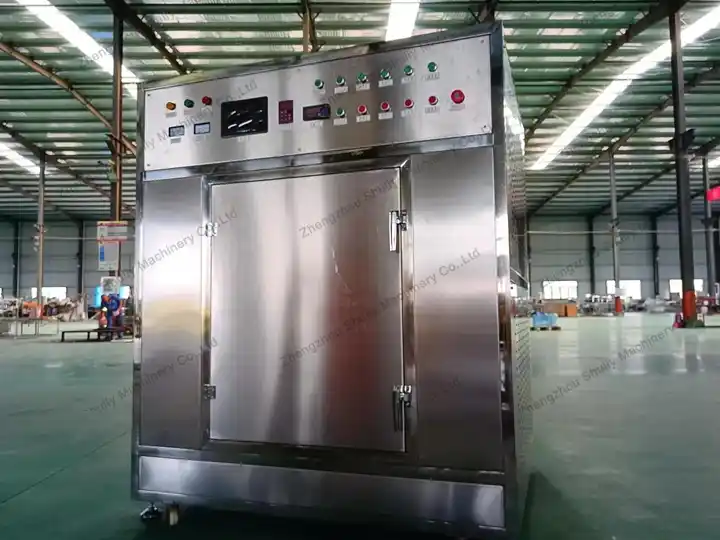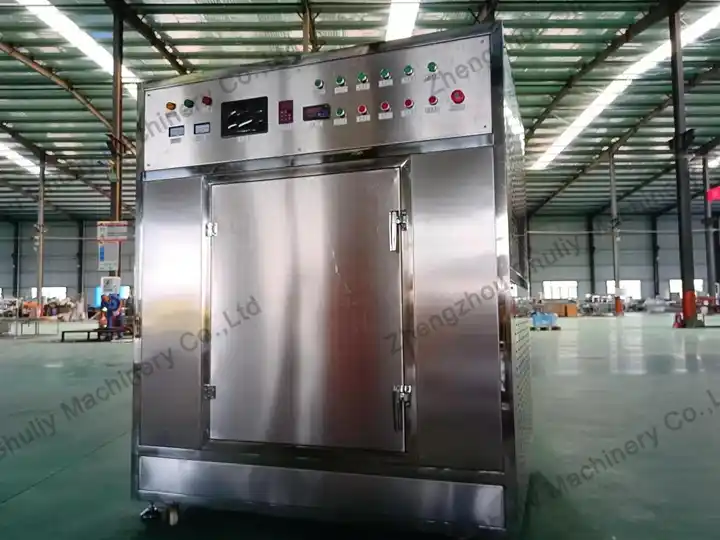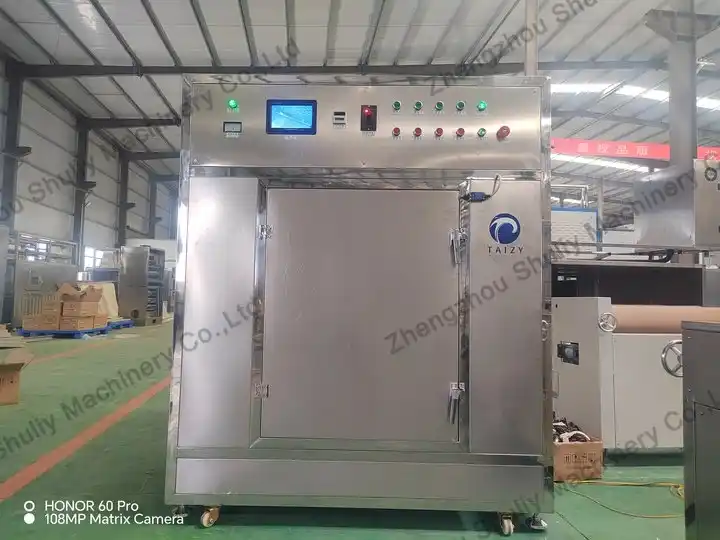
In industries like food, pharmaceuticals, and chemicals, drying equipment is essential. Among all kinds of drying techniques, the microwave dryer has the advantages of high efficiency, low power consumption, accurate temperature control, and can keep the original color and taste.
So, how does it work?
Working Principle of a Microwave Dryer
Different from conventional hot-air or infrared drying, microwave drying uses electromagnetic waves to heat up the interior of the material. The molecules vibrate quickly, producing heat from the inside. This results in an ”overall heating” effect from the inside out, which dries the material efficiently.

Microwave Penetration: Heating Inside and Out Simultaneously
Microwaves generally operate at a frequency of 2450 MHz ± 50 MHz. At this frequency, they can pass through the material’s surface and interact directly with the interior polar molecules, mostly water. This results in the rotation and vibration of the water molecules for a few hundred million times a second, creating internal heat that makes the water evaporate. Advantages over traditional drying methods:
- Much faster heating speed
- Even heating throughout the material, avoiding the issue of “dry outside, wet inside”
- Especially suitable for heat-sensitive or high-moisture products
Dielectric Heating: Microwaves Excite Molecular Motion
The core phenomenon behind microwave drying is dielectric heating. Water molecules, being polar, respond to the alternating electromagnetic field by constantly trying to align with it. This rapid rotation creates intense molecular friction, releasing a large amount of heat internally.
Simplified process
Microwave field → Water molecules vibrate → Internal heat → Moisture evaporates → Drying occurs
Moisture Evaporation and Discharge: Fast and Efficient Dehydration
Microwave heating not only vaporizes moisture quickly but also creates internal steam pressure. This pressure pushes the moisture from inside to the outside, where it is expelled via exhaust fans or ventilation systems.
- Compared to hot air drying, microwave drying:
- Drives moisture out naturally, without relying on surface heat gradients
- Enables rapid evaporation with minimal damage to the internal structure
- Retains nutrients and preserves product quality due to lower overall temperature exposure

Microwave Drying vs. Traditional Hot Air Drying
| Comparison Aspect | Microwave Drying | Traditional Hot Air Drying |
| Heating Method | Internal direct heating | External heat conduction |
| Heating Efficiency | Fast and uniform | Slow and uneven |
| Energy Consumption | Relatively low | High |
| Temperature Control Accuracy | High (suitable for heat-sensitive materials) | Greatly affected by environment |
| Product Quality | Better retention of nutrients and color | More likely to cause quality loss |
Microwave drying uses internal direct heating, where energy penetrates the material and heats it from the inside out. In contrast, traditional hot air drying relies on external heat transfer, which is slower and often leads to uneven results. Microwave systems provide faster and more uniform heating, making them especially efficient for materials that require precise moisture control.
In terms of energy consumption, microwave drying is more energy-efficient, as it minimizes heat loss and only targets the water molecules in the material. Temperature control is another major advantage—microwave dryers offer high precision, making them ideal for drying heat-sensitive products without compromising their structure or quality.
When it comes to the final product, microwave drying helps preserve nutrients, color, and texture more effectively, while hot air drying may cause thermal degradation, leading to loss of quality. These benefits make microwave drying a preferred choice in industries where quality and efficiency are top priorities.
How to Operate a Microwave Drying Machine?
- Turn on all main power switches and circuit breakers.
- Release the emergency stop button. The control panel screen will light up and clearly display the interior of the drying chamber.
- Press the exhaust fan start button. The white indicator light on the control panel will illuminate, activating both the exhaust and dehumidifying fans. Check if the internal small fans, the exhaust fan, and the dehumidifier fan are operating properly.
- Set the temperature according to the drying process requirements.
- Place the materials evenly on the trays inside the drying chamber.
- Turn on the conveyor switch and adjust the frequency inverter to rotate the trays, ensuring even heating.
- Start the microwave system. The microwave current meter should indicate normal operation, typically showing 2.4A on both channels.
Recommended Latest Model — 8kW Smart Rotary Tray Microwave Dryer (2025 Edition)
Model: SL-3
Power supply: 380V±5% 50Hz±1% 3PHASE
Microwave Output Power: 8kw
Number of trays: 3 pcs
Capacity: 5-7.5kg/batch
Microwave frequency: 2450MHz±50MHz
Overall Dimension: 1400×1200×1600(mm)
Microwave heating box: 1000*900*1000(mm)
Diameter of trays: 500mm
Tray speed: 0-40 circles/min(adjustable)
Temperature range, accuracy: 0-300℃ (adjustable)
Why We Recommend It?
- Smart Touch Control: Easy operation with programmable settings.
- Rotary Tray System: Ensures uniform heating across all materials.
- Stable Dual Microwave Channels: Consistent power output with precise current monitoring;
- Energy Saving: High microwave efficiency with lower power consumption;
- Compact Design: Space-saving structure suitable for labs, studios, or pilot plants.
